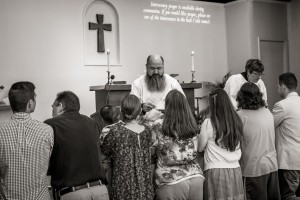
Reflections on Kairos Weekend: Lowell #24

Laboring For The Common Good
In our Prayers of the People, what does it mean to “labor for the common good,” and how would that “reflect the Kingdom of God”? Here is only a short blog-length partial answer to the question, but it may get us started. Follow a couple of lines of thought here and see if we don’t spiral upward into understanding at least part of the answer to the question. 
Imagine going to the doctor’s office with an illness. The doctor sees you, writes a prescription, and you feel well in a couple of days. Clearly, this was one person laboring for one person’s good (the doctor worked to make you better).
You can see how, patient after patient and day after day, the doctor labors for the good of others, for the “common good.” (That was easy.)
Now, what is reflecting the coming Kingdom of God about all of that? (Those of us who grew up with an Evangelical background may be dismayed that no one so far has gotten saved!) Well, think about what the prophets said about the coming Kingdom of God. Among so many other things, it will be a place of prosperity where people and communities flourish.
Do you notice that at each of the stages of production or service where different parts of the doctor’s office came together, everyone made a little bit of money? Politicians can argue about what policies have what effect on the process, but it is very basic economic wisdom that families and communities flourish when goods and services are produced and move rapidly through society. All those people were employed productively, not only providing goods or services that ended up creating a healing environment for patients but also providing support for their own families and the dignity that comes from working to support themselves and those they love.
Perhaps thinking about this makes you wonder if each of the workers was treated fairly. Were any treated unjustly? What could we do to remedy that injustice?
And maybe thinking even briefly about people creating a more flourishing community where they are treated with justice makes us think about – and yearn for – the coming Kingdom of God.
And all we have dealt with have been the two issues of economic productivity and economic justice – we barely made a dent in answering the question! There is so much more to be said – maybe later.
Be blessed in your daily work this week,

